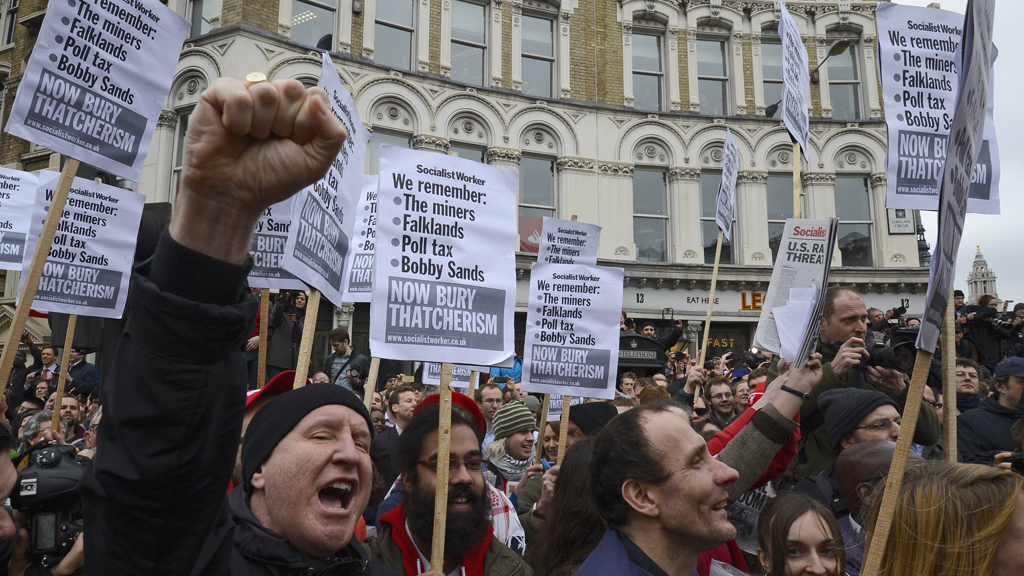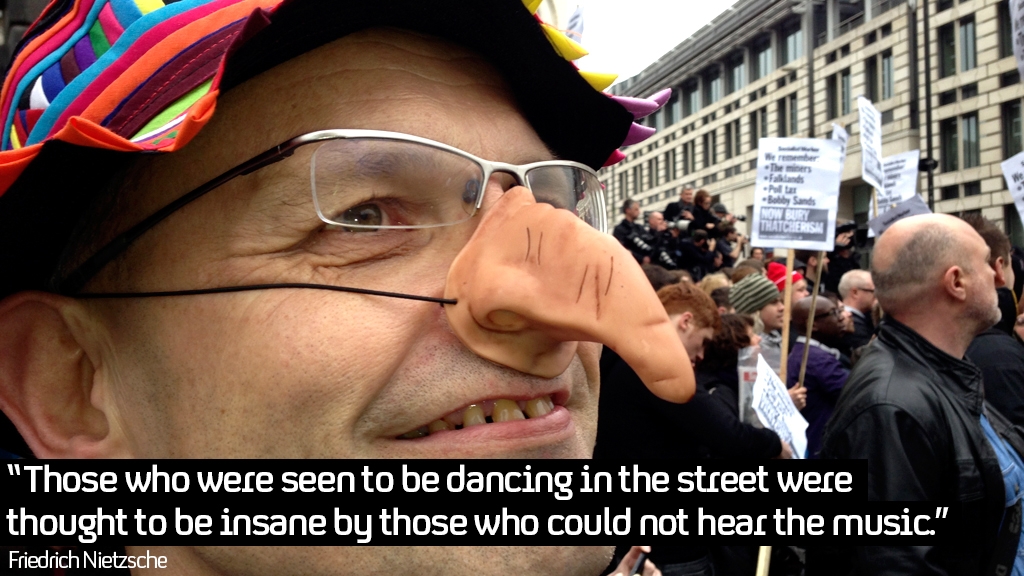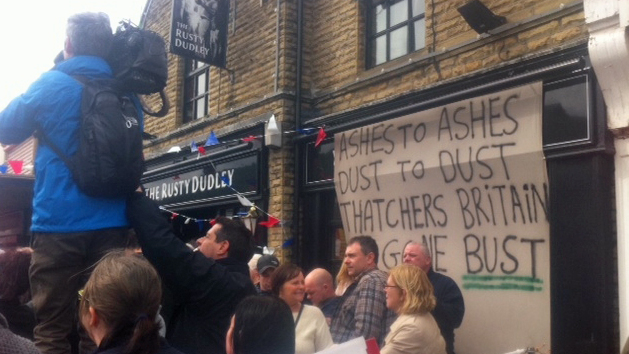Thatcher funeral prompts protests across the UK
Few post-war politicians polarised British politics like Margaret Thatcher – so it was not surprising that as well as demonstrations of affection, her funeral inspired protests across the country.

For many people – including those who were either not born in the 1980s or not old enough to vote – the divisions that Margaret Thatcher created are still with us.
So there was anticipation that the protests planned along the route of the Thatcher funeral procession on Wednesday might turn into something more serious than people simply turning their back on the cortege.
In the event, anti-Thatcher sentiment was confined mainly to hostile placards and individual expressions of dislike.
No concerted action
The combination of a high-profile police presence (the Met, the City of London, and British transport police forces provided more than 4,000 officers), limited space on the pavement along the route, and a large number of pro-Thatcher spectators, all militated against widespread concerted action.
In fact, nobody was arrested in the capital in the course of the procession, according to Scotland Yard.
We are grateful to those members of the public who spoke with us prior to the event. Cmdr Christine Jones, Metropolitan police
Commander Christine Jones thanked protesters who contacted Scotland Yard ahead of the funeral to signal that they planned to take action.
“We are grateful to those members of the public who spoke with us prior to the event and enabled us to facilitate their peaceful protest in a way which did not impact either their protest or those who wished to pay their respects,” she said.
‘Turn your head’
The focus of attention ahead of the funeral was Ludgate Circus, about a quarter of a mile from St Paul’s cathedral. It was there that the “Turn Your Head on Thatcher” Facebook site had told anti-Thatcherites to gather as the funeral procession passed.
There had also been talk on Facebook of a “Maggie’s Good Riddance Party”, to begin outside St Paul’s at the same time as the funeral service inside.
However, little materialised beyond an impromptu post-funeral “Speakers’ Corner” megaphone debate between Thatcherites and the former prime minister’s opponents (see video below).
Politicised by Thatcher
Channel 4 News spoke to several protesters as they awaited the cortege at the bottom of Fleet Street. One man, a Scot living in London, said the only good thing Margaret Thatcher had achieved was the decimation of the Conservative party in Scotland.
He asked why the country was celebrating someone who had supported “dictators like Pinochet and Suharto” while dismissing Nelson Mandela as a terrorist.
I remember thinking, ‘What is going on in the country?’ and watching the police attack lines of ordinary people. Thatcher funeral protester
Another protester, who said he was 10 years old when Margaret Thatcher came to power, claimed to have been politicised by the miners’ strike.
“I remember just thinking, ‘What is going on in the country?’ and watching the police attack just lines of ordinary people,” he told Channel 4 News.
On a more philosophical note, one man was inspired to quote Nietzsche as the hearse approached: “Those who were seen to be dancing in the street were thought to be insane by those who could not hear the music.”

‘Waste of money’
One version of the Thatcher premiership has it that working communities in Wales, Scotland and the north of England were forced to bear the brunt of her industrial policies, while she held on to power by retaining a core constituency in the home counties.
That interpretation was borne out by the protests elsewhere in the UK today. In Scotland, former miners branded the Thatcher funeral a waste of money as they reflected on the Iron Lady’s local legacy.
One former miner, Alan Kierzokowski, of Newtongrange, said emotions were still running high in mining towns, more than 22 years since Thatcher has stood down as prime minister.
She was a hated figure then, and she still is a hated figure, even in death. Alan Kierzokowski, former miner
“She was a hated figure then and she still is a hated figure, even in death,” he said.
In the former mining community of Goldthorpe, South Yorkshire, an effigy of the late Conservative leader was strung up in a noose outside the Union Jack social club.
Demonstrators left a mock coffin outside another pub, The Rusty Dudley (see image below), while they had a drink before moving on to burn the coffin on a pyre.
In Merseyside, scene of the Toxteth riots and of conflicts with dockers in the 1980s, Liverpool city council made the decision not to show the funeral on the big screen in the town centre in Clayton Square.

-
Latest news
-
‘Government responsiveness should be improved’ says infected blood inquiry chair4m

-
Infected Blood scandal: How UK failed on a global scale4m

-
‘There’s a strong evidential basis’ for ICC to grant arrest warrants for Netanyahu, says criminal law expert4m

-
International Criminal Court prosecutor seeks arrest warrants for Israel PM and Hamas leaders3m

-
‘Highly unlikely there was foul play’ in Iran president helicopter crash, says Tehran professor5m

-




